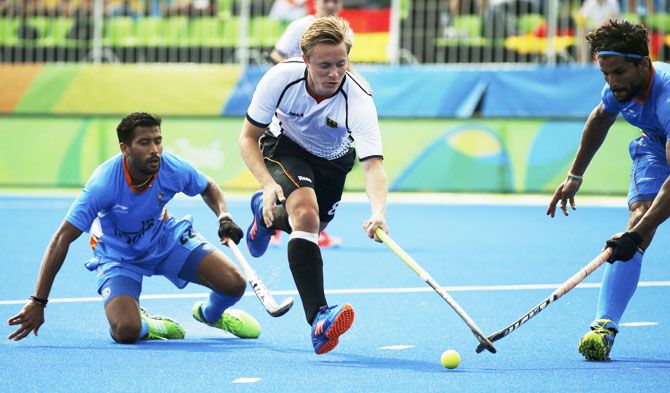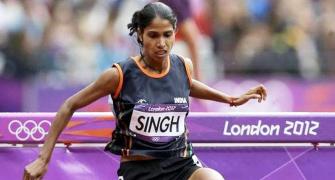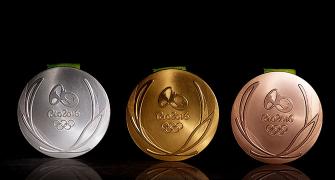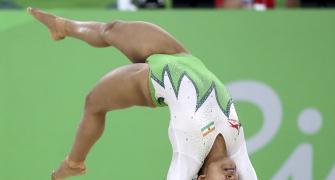
The Indian men's hockey team's habit of conceding late goals continued to haunt them as reigning double Olympic champions Germany scored seconds from the final hooter to steal a 2-1 victory in a thrilling Pool B match at the Rio Olympics on Monday.
It was heartbreak for Indian fans, as despite playing near perfect hockey for the major part of the match the Germans scored the match-winner with just 3.1 seconds from full-time.
After weathering India's attacking onslaught for most of the game, the Germans exerted tremendous pressure on the Indian defence in the last two minutes.
The Indian defence, which had a good match and stood firm all throughout, fumbled in the final seconds as Christopher Ruhr scored the winner with a deflection from close range.
Earlier, Germany took the lead against the run of play through a field goal from Niklas Wellen in the 18th minute before Rupinder Pal Singh drew parity in the 23rd minute, converting his third penalty-corner of the Games.
The victory enabled Germany maintain their successful run against India since 1996.
India last defeated Germany in the Olympics way back in the Atlanta Games when they secured a 3-0 victory.
However, despite the loss, the Indians can take heart from the fact that they dished out a better display against the Germans than what they managed in the recent past, which includes a 3-3 draw against a depleted German side in the Champions Trophy in London and 0-4 thrashing in Valencia just prior to the Olympics.
India started the match as underdogs going by the recent record against the mighty Germans, who are in search of their third successive Olympic gold, but it turned out to a very closely-contested battle.
The Indians had the better share of exchanges in the first quarter and even put the opposition under tremendous pressure midway through the first quarter, but the German defence did just enough to avert any crisis.
It was India who had the first scoring chance in the 11th minute but Nikkin Thimmaiah's reverse hit from Akashdeep Singh’s feed was padded away by an alert Nicolas Jacobi in front of the German goal.
After a barren opening quarter, the reigning Olympic champions enjoyed a good share of possession at the start of the second and broke the deadlock in the 18th minute against the run of play when Niklas Wellen beat Indian goalkeeper Sreejesh with a forehand strike after being fed by Linus Butt.
The goal pumped up the Germans as they gave some anxious moments to the Indian defence thereafter.
Christopher Ruhr soon came close to doubling Germany's lead only to be denied by Sreejesh.

It took some brilliant individual effort from India's captain for the match, SV Sunil, to earn a penalty-corner, their first in the game. Rupinder pounced on the opportunity and despatched a powerful flick to the right of Jacobi to score his third goal of the Games and level the scores.
If not for German goalkeeper Jacobi, India could have scored at least three to four more goals.
An alert Jacobi first kept away Nikkin's deflection in the third quarter and then came up with terrific double save to first deny Rupinder from India's second penalty-corner and then Chinglensana Singh from the resultant rebound as India made a promising start after half-time.
The German custodian again came to his side's rescue to keep away another Nikkin try minutes later.
Germany secured their only penalty-corner of the match in the 47th minute but skipper Moritz Fuerste's flick was deflected wide by Surender Kumar from the line.
India got another penalty-corner soon but this time Rupinder's try was blocked by an onrushing runner before Sardar Singh's deflection from a Surender cross just flew wide of the German goal.
But just when it seemed that India, ranked fifth in the world, had done just enough to take a point with the world No. 3 Germans, Ruhr spoiled the party with his late strike.
Germany had earlier defeated Canada 6-2 while India beat minnows Ireland 3-2 in their opening pool matches.
India will next play Argentina on Tuesday.
With two wins from as many games, Germany lead Pool B with six points, followed by Netherlands (4) and India (3).









